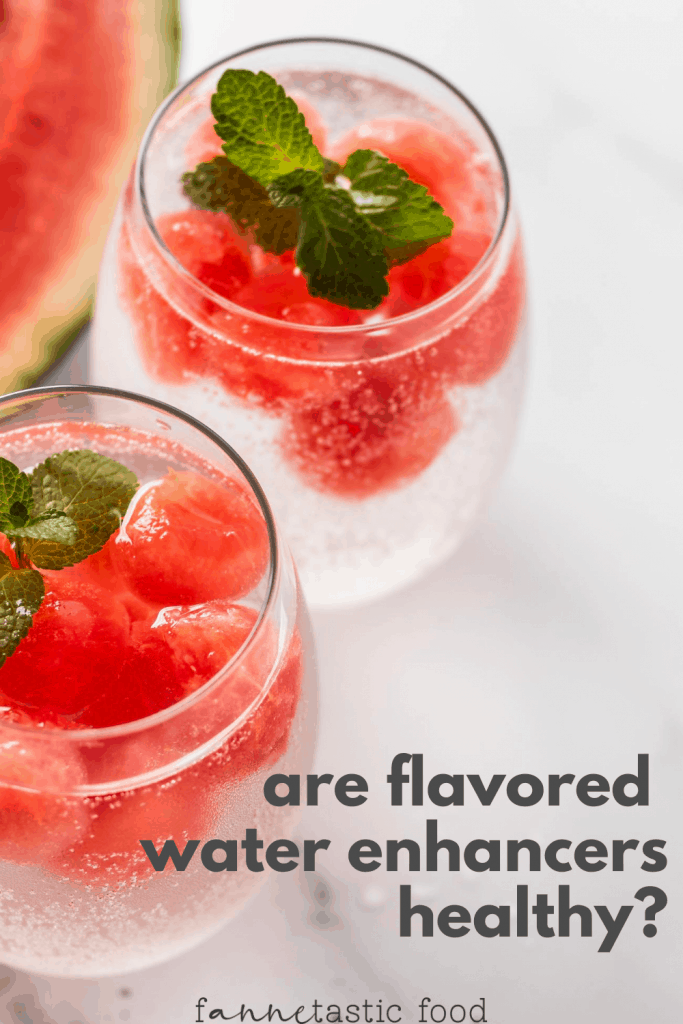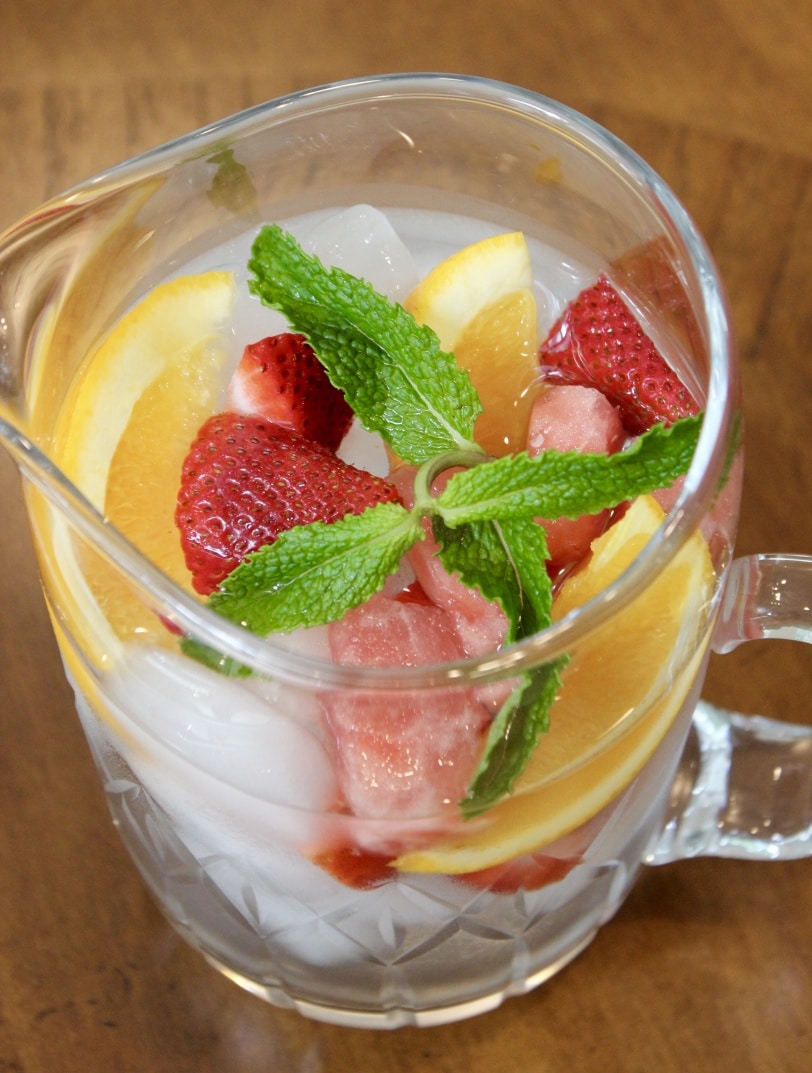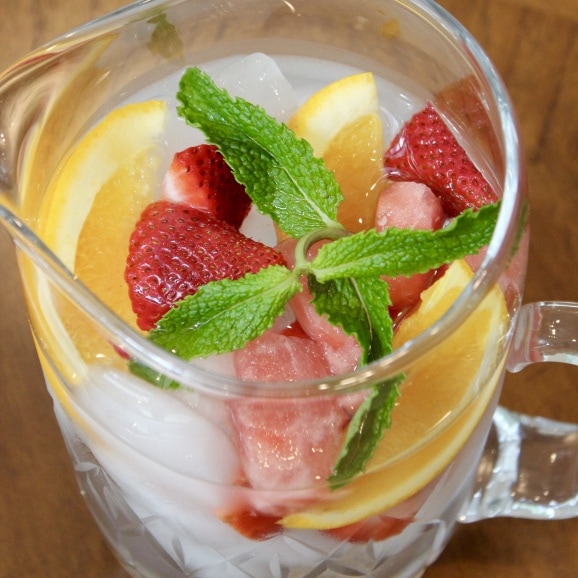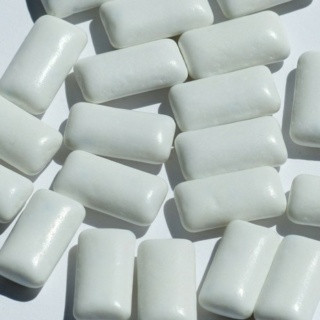It’s hot out, and that means most of us are guzzling liquid to stay hydrated. With the consumption of sweetened and flavored water becoming more and more popular, I thought it might be helpful timing to share a post about the topic! Is sweetened flavored water healthy? And what’s actually in it?
Let’s investigate…

Want to save this post?
Enter your email below and get it sent straight to your inbox. Plus, I'll send you great content every week!
What are common water flavor enhancers?
The most common water flavor enhancers (that you add to the water yourself vs. buying already sweetened water) are those little low-calorie or no-calorie packets or squeeze bottles that you can find at the grocery store to jazz up your water. They come in intensely sweet flavors like fruit punch, blueberry, and raspberry-lemonade among others.
These flavored water enhancers are super sweet because they contain high-intensity artificial sweeteners that are 200 to 20,000 times sweeter than sucrose (table sugar).
Common artificial sweeteners used in water flavor enhancers:
- Aspartame – This sweetener is very low-calorie and is 200 times sweeter than table sugar
- Acesulfame potassium – Ace-K is a non-nutritive (no calorie) sweetener that is 200 times sweeter than table sugar
- Saccharin – A non-nutritive sweetener that is 200 to 700 times sweeter than table sugar
- Sucralose – A non-nutritive sweetener that is 600 times sweeter than table sugar
How do artificial sweeteners work?
When you drink flavored water enhancers, artificial sweeteners bind to the taste buds on your tongue and the inside of your mouth. The taste buds then send a message to your brain to identify the taste as sweet.
Although sugar molecules and artificial sweeteners both send the same sweet signals to the brain, they aren’t metabolized by the body in the same way.
High-intensity sweeteners are not broken down into glucose molecules. Instead, they pass through the digestive system without being absorbed.
(This is how sugar alcohols work, too, which is why sugar alcohols often cause stomach pain.)
Since they aren’t broken down by the digestive system, high-intensity sweeteners don’t raise blood sugar and provide little to no calories.
Do high-intensity sweeteners change our perception of taste?
The taste and reward systems in the body are extremely complex.
While there is not enough evidence to rule an ultimate yes or no to this question, some research has found that people who consume artificial sweeteners often have altered taste perception. For example, one study found that artificial sweeteners actually increase appetite and contribute to sweet cravings by training taste buds to favor sweeter flavors. (source)
In other words, the bold flavor of these high-intensity sweeteners can hook us in and leave us desiring more sweetness, because these sweeteners are 200 to 20,000 times sweeter than regular table sugar!
If I only drink water that is flavored with high-intensity sweeteners, I’ll likely get used to my drinks being super sweet all the time and crave more.
I have found this to be anecdotally true with my nutrition clients who drink diet sodas or consume other artificially sweetened products (like yogurt or flavored water) – they often find that as they wean off artificial sweeteners, their taste buds adjust to prefer less sweet again, and then anytime they have an artificially sweetened product later on they will find it tastes TOO sweet because they are no longer used to it.
The bottom line is that repeated consumption of artificial sweeteners in flavored water enhancers and other food/drink products may train our brains to prefer highly intense sweet flavors.
Is it safe to drink flavored water enhancers?
High-intensity sweeteners in flavored water enhancers are generally recognized as safe for the general population by the FDA, but the reality is that we don’t know all of their effects on the human body, especially in the long term.
Of particular cause for concern, some studies have found that certain sweeteners may have adverse effects on human health by altering the bacteria in our digestive systems. (source)
These bacteria (otherwise known as gut microbes) play a major role in human health and are involved in metabolism, immunity, and digestion.
Overall, more research needs to be done to assess the effect of high-intensity sweeteners on the human microbiome.
Alternatives to water flavor enhancers
As a dietitian who knows all about the importance of drinking water, I have made it a habit to carry my water bottle everywhere with me. That said, I know not everyone loves plain water as much as I do!
Instead of drinking plain ol’ water you can try fruit infused water or herbal teas instead for some flavor! One fruit infusion I’ve been loving lately is strawberry, basil, and lemon.
It’s so refreshing, especially on these hot summer days! Another favorite is mint and lime – such a perfect combo.
How do I make fruit infused water?
To make infused water, simply add fruit and herbs directly into the water and let it infuse either at room temperature or in the fridge for up to twelve hours. You can also use an infuser pitcher. (affiliate link)
Using sparkling water instead of still water is another fun way to make infused water more interesting/fun!
How long does infused water last?
The infusions can last up to three days in the fridge, but if you prefer to keep your infusions at room temperature, it’s best to make a new batch every day.
For more infused water ideas, read my post on Tips + Recipes to Encourage Drinking More Water.

The final verdict: Are water flavor enhancers healthy?
The bottom line is that water flavor enhancers are safe to consume in moderation.
But that said, I’d focus on enjoying them on occasion vs. on an everyday basis. Try mixing it up and experimenting with fresh or frozen fruit infused water or sparkling water – you just might enjoy it!
Here are a few other posts that may be of interest:






